Epigea Repens, commonly known as Trailing Arbutus, is a medicinal plant native to North America.
It has a long history of traditional use among indigenous communities and has been utilized in homeopathic medicine for its therapeutic effects on urinary conditions, particularly chronic cystitis.
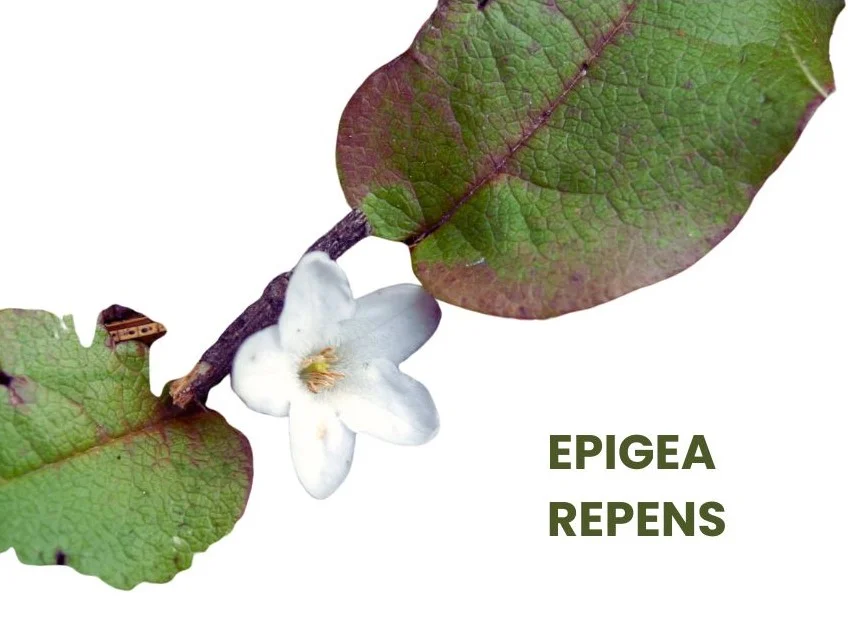
Table of Contents
ToggleSOURCE INFORMATION
Scientific Classification
- Kingdom: Plantae
- Order: Ericales
- Family: Ericaceae
- Genus: Epigea
- Species: Epigea Repens
Origin
- Epigea Repens, commonly known as Trailing Arbutus or Mayflower, is a low-growing evergreen shrub native to eastern North America.
- It is found in various habitats, including forests, woodlands, and rocky slopes, from Newfoundland and Labrador south to Florida, and as far west as Minnesota and Arkansas.
- The plant prefers acidic, well-drained soils and is often found in coniferous and mixed forests.
Historical Facts
- Trailing Arbutus has a rich historical significance and cultural association in North America.
- It was designated as the official flower of Massachusetts in 1918, and it is also the state flower of Nova Scotia.
- Indigenous peoples of North America, such as the Algonquian tribes, used various parts of the plant for medicinal purposes, including treating colds, coughs, and urinary issues.
- Trailing Arbutus is celebrated for its delicate, fragrant pink or white flowers, which typically bloom in early spring and are associated with renewal and the arrival of warmer weather after winter.
KEY CHARACTERISTICS
- Urinary Tract Afflictions: Epigea Repens is primarily indicated for chronic cystitis, characterized by dysuria (painful urination), tenesmus (ineffectual straining), and the presence of muco-pus and uric acid deposits in the urine. It may also address conditions such as gravel and renal calculi (kidney stones).
- Urine Composition: Fine sand in urine, typically of a brown color, is a characteristic symptom associated with Epigea Repens.
- Bladder Symptoms: Patients may experience burning in the neck of the bladder during urination, followed by tenesmus afterward. Incontinence of urine and pyelitis (inflammation of the renal pelvis) may also be present.
- Gastrointestinal Symptoms: Croaking noise and rumbling in the bowels may occur, although this symptom is not elaborated upon in detail.
MODALITIES
- Specific modalities are not explicitly mentioned in the provided description.
RELATIONSHIP WITH OTHER DRUGS
- Comparison: Epigea Repens is compared with other remedies like Uva Ursi (Uva), Chimaphila, Lycopodium (Lyc), and Pareira Brava, suggesting potential similarities in their therapeutic indications.
- Chemical Constituents: Epigea Repens contains Arbutin, a compound also found in Uva Ursi, as well as Formic Acid.
DOSE
- The recommended dosage of Epigea Repens is tincture in 5-drop doses every three hours.
Frequently Asked Questions
What are the primary urinary symptoms that Epigea Repens addresses?
- Epigea Repens is indicated for chronic cystitis with dysuria, tenesmus after micturition, presence of muco-pus and uric acid deposit in urine, gravel, renal calculi, and the presence of fine sand in urine.
Is Epigea Repens safe for self-administration?
- As with any homeopathic remedy, it is advisable to consult with a qualified homeopath or healthcare professional for proper evaluation and dosage recommendations tailored to individual symptoms and health conditions.
What are the chemical constituents of Epigea Repens?
- Epigea Repens contains Arbutin and Formic Acid, compounds known for their medicinal properties in addressing urinary tract issues.
Meaning of Difficult Words
- Chronic cystitis: Long-term inflammation of the bladder, often characterized by symptoms such as frequent urination, pain or discomfort during urination, and blood or pus in the urine.
- Dysuria: Painful or difficult urination, typically experienced as a burning sensation.
- Tenesmus: The feeling of incomplete evacuation after a bowel movement or urination, often accompanied by a persistent urge to defecate or urinate.
- Muco-pus: A combination of mucus and pus, often present in inflammatory conditions such as cystitis, indicating infection or irritation.
- Uric acid deposits: Crystalline deposits of uric acid in the urine, which can contribute to the formation of kidney stones or gravel.
- Gravel: Small, gritty particles or stones that may form in the kidneys or bladder, causing pain and discomfort during urination.
- Renal calculi: Kidney stones, solid masses made up of crystals that form in the kidneys and can cause severe pain and urinary symptoms.
- Pyelitis: Inflammation of the renal pelvis, the part of the kidney where urine collects before being transported to the bladder.
- Croaking noise: A sound resembling the croak of a frog, possibly indicating gastrointestinal discomfort or disturbances.
- Rumbling in the bowels: Audible sounds produced by the movement of gas and fluids in the intestines, often associated with digestion or gastrointestinal activity.

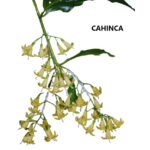
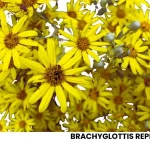

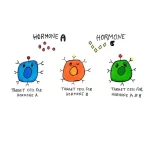
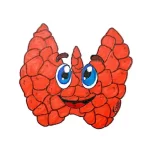
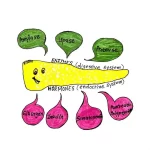
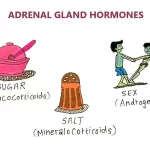

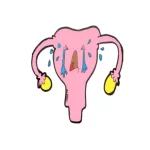

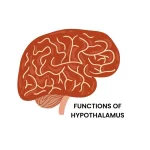
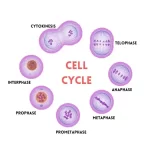
Leave a Reply